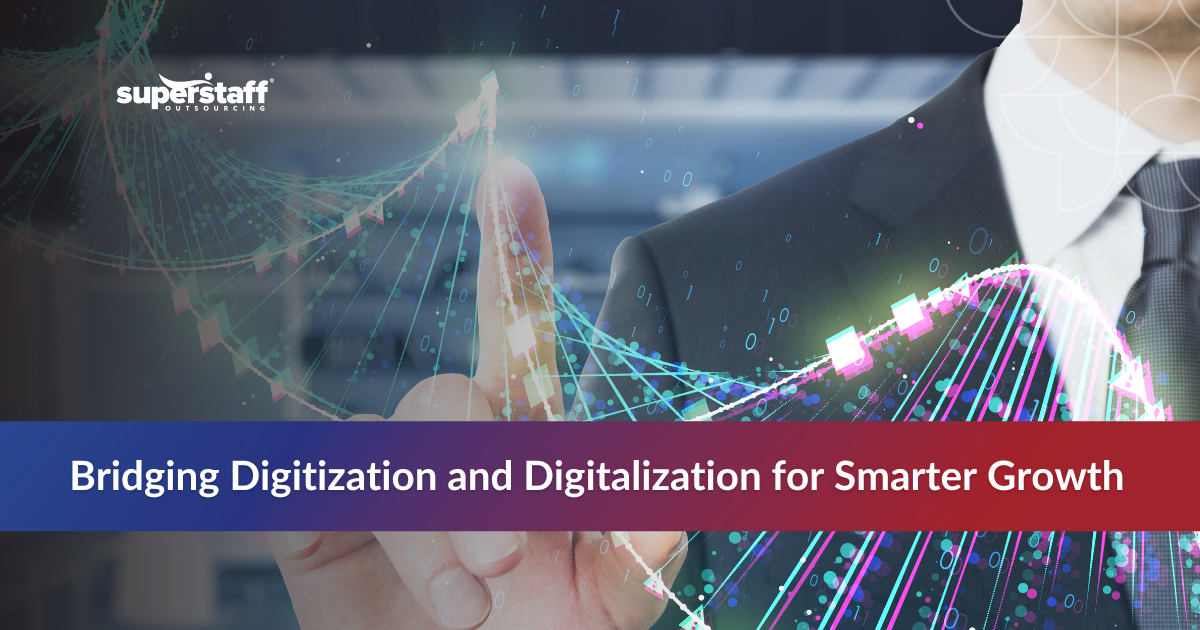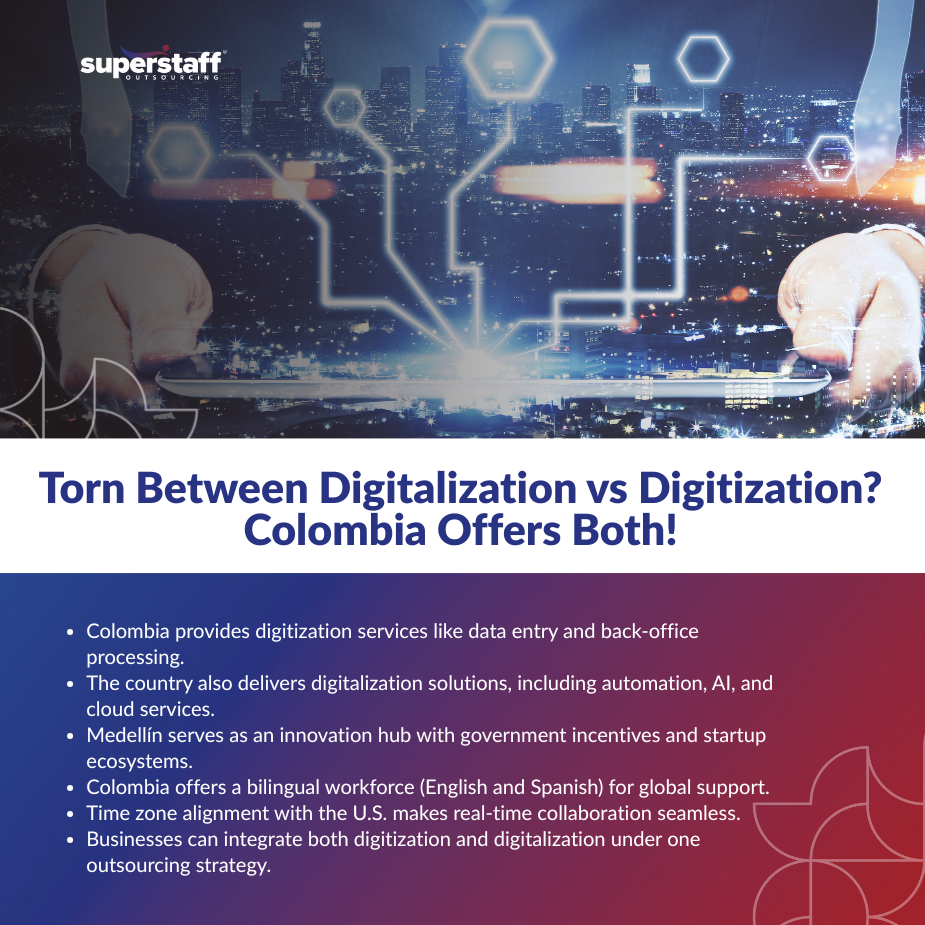
Many companies confuse digitalization vs digitization, often treating the two as interchangeable. But in reality, the difference between them can make or break a company’s transformation strategy. Businesses that fail to recognize this distinction risk focusing only on surface-level improvements instead of unlocking the full potential of technology-driven change.
Digitization is the straightforward act of converting analog information into digital formats. Think scanned documents, digitized records, or automated data entry. Digitalization, on the other hand, goes beyond conversion; it involves reimagining business processes, customer experiences, and even entire operating models using digital technologies.
Understanding this difference is crucial in outsourcing, where the type of support you seek depends on whether your business needs efficiency through digitization or innovation through digitalization.
Colombia’s outsourcing sector delivers value on both fronts. For U.S. companies struggling with rising costs and talent shortages, Colombian teams provide reliable digitization services such as data management and back-office support, while also offering advanced digitalization capabilities in automation, analytics, and IT solutions. This dual strength allows businesses to meet today’s operational demands while preparing for tomorrow’s opportunities.
By bridging digitalization vs digitization, Colombia positions itself as a strategic partner for U.S. companies pursuing tech-driven outsourcing, helping them transform not just processes, but overall business outcomes.
Digitization focuses on converting analog information into digital formats
At its most basic level, digitization refers to the process of converting analog information into digital formats. This is the act of taking something physical, like a paper document, a handwritten form, or even an audio recording, and transforming it into a digital file that can be stored, accessed, and processed electronically.
Examples of business digitization services include:
- Scanning paper contracts into PDFs.
- Converting old customer records into digital databases.
- Automating manual data entry processes so they’re captured digitally at the source.
- Creating searchable digital archives of physical files.
Digitization doesn’t alter the underlying process; it simply translates analog into digital. Still, it brings immediate efficiency and cost-saving benefits. Digital files are easier to store than boxes of paper. They can be shared quickly across geographies, reducing reliance on couriers or manual handling. They are also far less prone to physical loss or damage.
For many businesses, digitization represents the first step toward transformation. It provides the foundation upon which more advanced technologies, like automation, artificial intelligence, or predictive analytics, can be built. Without digitization, companies cannot meaningfully engage in digitalization.
While digitization lays this essential groundwork, digitalization takes the concept much further by changing how businesses actually function.
Digitalization is about using digital technologies to enhance processes, strategies, and customer experiences
To better understand digitalization vs digitization, here is a helpful distinction to remember: If digitization is about converting, digitalization is about transforming. It’s the use of digital technologies not just to store or manage information, but to reshape business processes, create new strategies, and improve customer experiences.
Examples of digitalization include:
- Automating workflows to eliminate repetitive tasks.
- Using predictive analytics to forecast customer demand and optimize supply chains.
- Implementing omnichannel customer experience (CX) platforms to ensure seamless support across phone, chat, email, and social media.
- Building new digital-first products or services that didn’t exist before.
Where digitization provides the raw digital material, digitalization uses it strategically. It’s about turning data into insights, automation into efficiency, and digital platforms into competitive advantage. Businesses that embrace digitalization move beyond cost reduction; they drive innovation, agility, and differentiation.
However, digitalization requires higher-level strategic thinking and skilled execution. It involves IT architects, data scientists, CX designers, and other specialized professionals. Unlike digitization, which can be largely operational, digitalization touches strategy, culture, and long-term value creation.
With the difference between digitalization and digitization explained, the next question is: where does Colombia fit into this picture?

Colombia has become a nearshore powerhouse for digitization services
Over the past decade, Colombia has quietly positioned itself as a leader in digitization services for global companies. U.S. firms, in particular, have looked to Colombia for reliable, cost-effective support in essential back-office functions.
Digitization services in Colombia include:
- Data entry and processing: High-quality data entry teams trained to handle financial records, medical files, and customer data.
- Back-office support: Efficient processing of invoices, compliance documents, HR records, and other administrative tasks.
- Digital archiving: Secure digitization of physical records for industries like healthcare, insurance, and logistics.
The appeal lies in cost savings compared to U.S. operations. Labor costs in Colombia are significantly lower, allowing U.S. businesses to scale digitization projects without breaking budgets. But unlike low-cost markets with language barriers, Colombia also offers English- and Spanish-speaking talent, enabling seamless service for both North American and Latin American customers.
For businesses that want to take their business digitization services offshore but remain close enough for effective collaboration, Colombia strikes the perfect balance.
Yet Colombia is not limited to basic digitization. The country is rapidly building capabilities in digitalization—an area that requires advanced tech talent and innovation ecosystems.
Colombia is also thriving in digitalization, leveraging tech talent and innovation ecosystems
Colombia’s story is no longer just about back-office efficiency. Increasingly, the country is becoming a hub for digitalization, supporting companies that want to modernize and innovate.
Key drivers for the rise of digitalization and digitization services in Colombia include:
- Tech hubs in Medellín and Bogotá: Medellín, once known for instability, has reinvented itself as a “Silicon Valley of South America,” with thriving IT clusters and innovation districts. Bogotá, as the capital, attracts investment and global partnerships.
- Government incentives: Colombia has introduced tax benefits, innovation funds, and training programs to grow its IT workforce and support foreign investors.
- Startup culture: A surge in Colombian tech startups is fostering innovation and creating a talent pipeline with skills in AI, cloud computing, and automation.
Colombia now offers a skilled workforce in cloud, AI, and automation that rivals many traditional outsourcing destinations. The country is also well-positioned geographically: its time zone alignment with the U.S. makes real-time collaboration far easier compared to offshore destinations in Asia.
This makes Colombia a nearshore partner not only for routine digitization projects but also for advanced digitalization initiatives that drive long-term competitive advantage.
Taken together, these strengths make Colombia unique—it delivers value in both digitization and digitalization.
The real value lies in integrating digitization and digitalization under one outsourcing strategy
While it’s useful to distinguish digitalization vs digitization, the real power comes from integrating the two. A business that digitizes without digitalizing simply reduces costs; a business that digitalizes without digitizing may lack the foundational data needed to innovate.
Colombia’s outsourcing sector enables U.S. companies to scale from simple digitization projects to complex digital transformation initiatives without having to switch providers or build entirely new teams.
Advantages of this integrated approach include:
- Unified talent pool reduces operational silos: One outsourcing partner can handle both record digitization and advanced analytics, streamlining workflows.
- Faster progression from cost savings to strategic growth: Companies start with efficiency gains and quickly move to innovation-driven results.
- Agility in adapting to change: With both digitization and digitalization capabilities available in Colombia, businesses can pivot strategies as markets evolve.
For U.S. companies navigating uncertainty, whether from economic pressures, labor shortages, or technological disruption, Colombia offers a resilient, future-ready solution.
Businesses that want both efficiency and innovation should see Colombia as a long-term partner in transformation.
Understanding Digitalization vs Digitization is Only the First Step. Accelerate Tech Initiatives With the Right Provider.
Digitization and digitalization are not interchangeable, but both are essential. Companies that understand the difference between digitalization and digitization explained clearly can design smarter outsourcing strategies.
Digitization is the foundation: converting analog into digital for efficiency and cost savings. Digitalization builds on that foundation: transforming processes, strategies, and customer experiences.
Colombia excels in both, offering world-class digitization services as well as advanced digitalization solutions powered by tech talent and innovation ecosystems. The integration of the two within one outsourcing strategy provides unmatched value for U.S. companies.
If your business is ready to go beyond surface-level improvements and embrace full-scale transformation, partner with SuperStaff. Our teams in Colombia deliver both business digitization services and forward-looking digitalization strategies, helping you build efficiency today and innovation for tomorrow.






